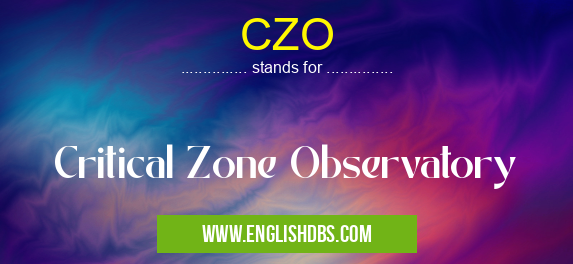What does CZO mean in UNCLASSIFIED
A Critical Zone Observatory (CZO) is a type of research facility that studies the Earth's critical zone and its interconnected processes. The program was initiated by the National Science Foundation (NSF) in 2007 with the goal of understanding the structure, functioning, and evolution of Earth's critical zones. These observatories provide scientists with a way to monitor and analyze Earth's critical zone in detail.

CZO meaning in Unclassified in Miscellaneous
CZO mostly used in an acronym Unclassified in Category Miscellaneous that means Critical Zone Observatory
Shorthand: CZO,
Full Form: Critical Zone Observatory
For more information of "Critical Zone Observatory", see the section below.
Essential Questions and Answers on Critical Zone Observatory in "MISCELLANEOUS»UNFILED"
What is a Critical Zone Observatory?
A Critical Zone Observatory (CZO) is a type of research facility that studies the Earth's critical zone and its interconnected processes. It was initiated by the National Science Foundation (NSF) in 2007 with the goal of understanding the structure, functioning, and evolution of Earth's critical zones.
What is the purpose of CZOs?
The purpose of CZOs is to provide scientists with a way to monitor and analyze Earth's critical zone in detail. This helps researchers understand how processes like hydrology, geochemistry, climate, ecology, biology, and land use affect one another within this key ecosystem.
How many CZOs are there?
As of 2021, there are nine operational CZOs operating across the United States. Each observatory focuses on different aspects of Earth's critical zone such as urban environments or sediment transport dynamics.
Is it possible to visit CZOs?
Yes! Some CZOs offer public tours or educational programs for visitors who want to learn more about their research initiatives or explore hands-on activities related to environmental science topics.
How does NSF fund CZO research?
NSF provides funding for research conducted at CZOs through grants awarded to university-led teams or individuals who then lead experiments at specific sites. This allows researchers from diverse backgrounds to collaborate on projects that are relevant to their field but also benefit from pooled resources among multiple teams at an individual observatory site.
Final Words:
The Critical Zone Observatory network serves as a platform for scientists all over the US to conduct interdisciplinary research while simultaneously providing educational opportunities for students and members of the community interested in learning more about our unique environment. By engaging both local citizens and global communities alike in their mission, these facilities offer us valuable insight into how human activity impacts our planet's most precious resource - its ecosystems.
